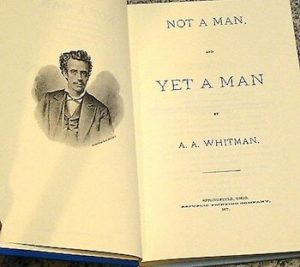
Albery Whitman
"Yet A Man"
*Albery Whitman was born on this date in 1851. He was a Black poet, minister, and orator.
Albery Allison Whitman was born into slavery at a farm near Munfordville, Kentucky. After years as a manual laborer, working at a plow shop, on railroad construction, and as a teacher, Whitman attended Wilberforce University in 1870. There, he studied with Bishop Daniel Payne. Whitman stated that he wrote his 1877 poem "Not a Man and Yet a Man" so that "he might speak more effectively for Wilberforce." After six months at Wilberforce, Whitman left to become the financial agent for the university and an African Methodist Episcopal Church pastor in Springfield, Ohio.
Whitman and his wife Caddie had four daughters. The daughters formed the vaudeville troupe, the Whitman Sisters, who performed together from 1900 to the 1940s. Joan Sherman's entry in African American Poetry of the Nineteenth Century refers to Whitman's poetry as "attempts at full-blown Romantic poetry," emulating the American and British authors from that tradition. Yet Dickson Bruce argues that "Whitman went beyond sentimental ideals in his understanding of literature, and even beyond the ideological directions outlined by Douglass and his colleagues." Whitman's poems are not regularly reprinted in modern anthologies of Black poetry. Benjamin Brawley referred to Whitman as "probably the ablest of the race before Dunbar," a recent scholar echoes this view, asserting that Whitman was "one of the most important African American poets between Phillis Wheatley and Paul Laurence Dunbar and probably the most prolific."
He later took other pastoral positions between 1879 and 1883, leading and establishing churches in Ohio, Georgia, Kansas, and Texas. He died in 1901 of pneumonia. In 1901, the year of his death, Whitman published "An Idyl of the South: An Epic Poem in Two Parts." The opening four lines suggest high romantic poetry through a sentimental reflection on the South: "Hail land of the palmetto and the pine, /From Blue Ridge Mountain down to Mexic's sea/Sweet with magnolia and cape jessamine, /And thrilled with song, — thou art the land for me!" Ivy Wilson notes that Whitman employed "multitudinous metrical configurations" and that "he was consumed with the aesthetics of sound. Much of his major volumes read like novels in verse."
Born into slavery, Whitman created a successful career for himself as a writer and, during his lifetime, was acclaimed as the "Poet Laureate of the Negro Race." Throughout his lifetime, he worked as a manual laborer, schoolteacher, financial agent, fundraiser, and pastor. He died in Atlanta in 1901 of pneumonia.